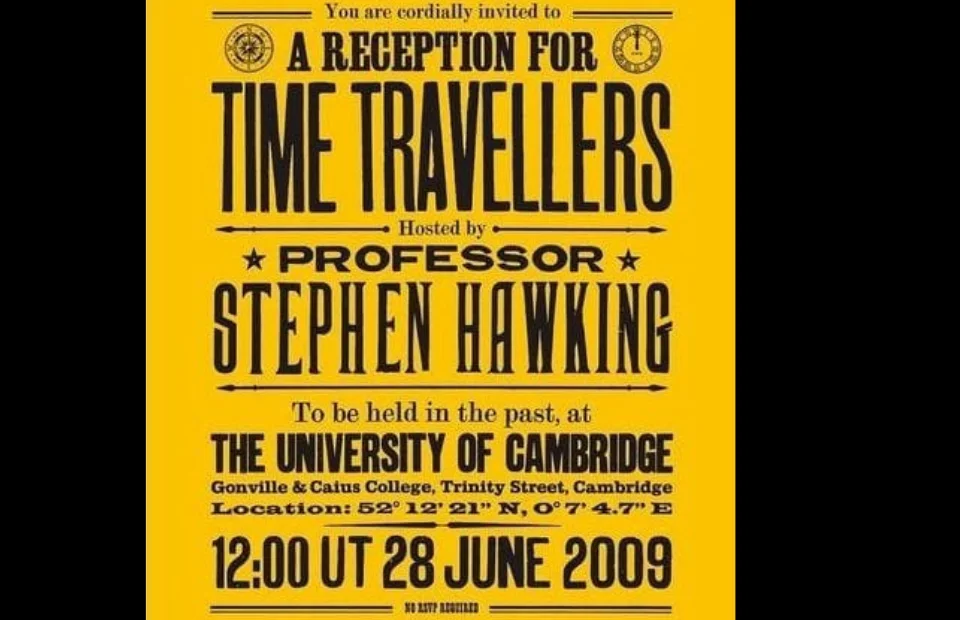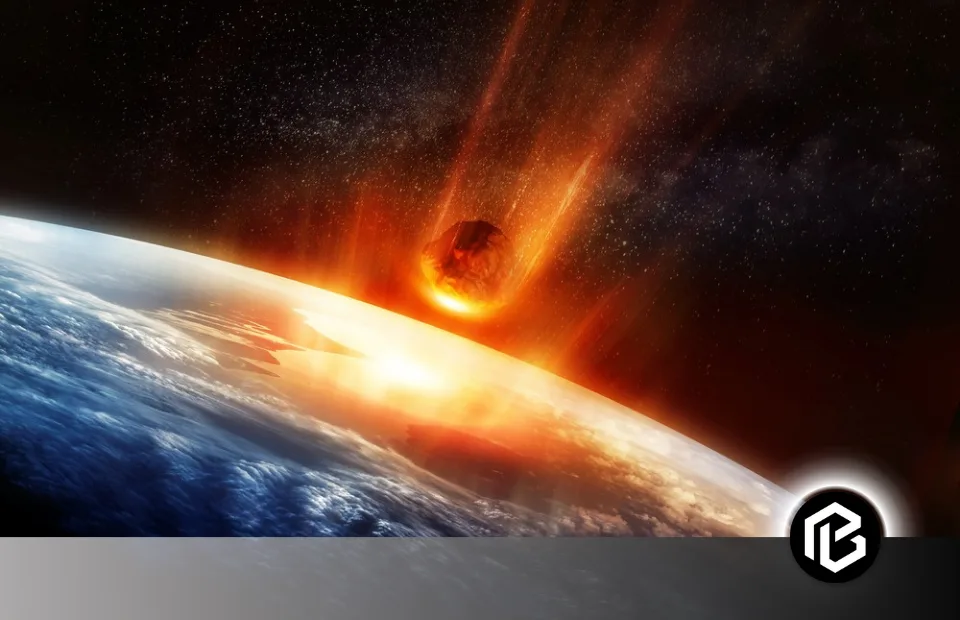Hello!! Today we will talk about parties, because why not? Everybody loves a good party. Even scientists need to let their hair down now and again. However, this would be the party of a lifetime, because the only people allowed to attend were time travelers.
So, friends, you are very well aware of the mathematical symbols. π is one of them. The symbol and its value (π = 3.14) is a very mysterious number in itself. If you focus on this number, it represents 14 March which is also known as Pi Day. Moreover, this day is associated with the two brilliant personalities of the world. On 14th March, Elbert Einstein was born and on the same day, 14th March 2018, Stephen Hawking died.
Today, Stephen Hawking is not with us but the theories and experiments he has given to the world, open up a whole world of physics in front of us. The way he understands the Universe and his thought process is very different and captivating. Stephen Hawking is the man famed for his groundbreaking work in studying black holes and describing the origins of the universe.
Elbert Einstein’s work of making us understand the Universe is very unique. So, time moves forever forward, as it always does. Einstein’s general theory of relativity seems to offer the possibility that we could warp space and time so much that we could travel back in time.
For fictional writers, his work also hinders the possibilities of time travel.
Moreover, Einstein determined the relative nature of time. He proved that for two observers who are moving at different speeds, the time speed is different for each of them.
- Travel Back to 28 June 2009 to Attend Stephen Hawking's Time Travel Party
- Stephen Hawking's Point of View About Time Travel
- Time Travel in Scientific Terms
- Ethical Considerations and Potential Dangers of Time Travel
- Impact of Hawking's invitation on the public perception of science
- Conclusion
- Frequently Asked Questions on Stephen Hawking's Time Travelers Invitation
Travel Back to 28 June 2009 to Attend Stephen Hawking’s Time Travel Party
While practically the idea of time travel was not possible It was believed that, theoretically, this could maybe be done.
Do you know, Stephen Hawking wanted to prove that time travel is real, so he thought why not just set up an event that time travelers should attend? And if they don’t turn up, then maybe time travel isn’t real.

Stephen Hawking arranged a party to be held at Cambridge University at midday on the 28th of June 2009, inviting all to a reception. The party included balloons, decorations, and champagne. It was to prove that time travel may be possible one day. He dressed up all nice, decorated a room ready for the party, and waited for his guests to arrive at midday.
Inviting party guests who were exclusively time travelers. Yes, a hip place to be, and that’s only where the cool people are invited to. I would love to turn up to a time traveler party because you could just talk about all the coolest periods you’ve been to or theoretically, where you would go if you could travel through time.
Unfortunately, when midday came and went nobody turned up. Strange!
Either Stephen Hawking’s not cool enough and nobody came, or the more likely reason is that time travel just isn’t possible.
But anybody going to this party had to be a time traveler because Stephen Hawking told pretty much nobody. All he did was create an invitation that he released after the party. Meaning that anybody who found this invitation and knew where to go was only able to attend if they were a time traveler.
Stephen Hawking’s Point of View About Time Travel

Hawking’s Unique Approach to Engage with Time Travelers
Stephen Hawking, the famous physicist and cosmologist gives a unique perspective on time travel. However, many scientists and philosophers also have theories about the feasibility and implications of time travel but Hawking’s approach is unique and different.
In 1988, Stephen Hawking discussed in detail all the time-traveling concepts in his book “A Brief History of Time”. He talked about terms like space, time, Quark, Big Bang, and black holes in this book.
In 2009, Stephen Hawking hosted a party for time travelers at the University of Cambridge. Stephen Hawking’s Party Invitation for Time Travelers wasn’t just a playful idea, it was a way for him to make us think about time differently. Hawking wanted us to consider that time might not just go straight from the past to the future. Instead, it could be like a place we can move around in. So, by inviting guests from the future, he was saying that time might not be a simple line, but more like a space that we can travel through.
Stephen Hawking wants to show the different possibilities for the Future through his perception. According to him, the future is not already decided, but instead, it’s like having many possible outcomes. He wants us to understand that time isn’t just moving in one direction like a straight road. Instead, he thinks it’s more like a complex system where we can move in different ways.
Hawking’s invitation makes us think differently about time. It’s a big deal because it changes how we see time and its parts. Usually, people think time goes in a straight line, one thing after another. But Hawking is saying there could be many possible futures. He’s suggesting that time is not just a straight line; it’s like a bunch of different directions we can go in. This new way of looking at time is important because it helps us understand time better and how it’s connected to space.
Paradoxes and Ethical Dilemmas of Time Travel
When we are talking about time traveling we hear a problem called the grandfather paradox. It’s just like asking if you can go back in time and stop your grandpa from meeting your grandma. If you do that, it might change everything, and you might not be born. it seems weird! Hawking knows well about this problem, and he thinks maybe it’s just not possible to change the past. He says if you mess with the past, it could cause big problems that we didn’t expect and could be bad.
There’s another paradox about time travel called the butterfly effect. It is based on the question “if the small things we did in the past can cause really big changes in the future?”. Stephen Hawking agreed with the existence of this paradox and he thought maybe it’s not possible to avoid it. So, He has suggested even tiny changes in the past can make a really big difference in the future, and we might not be able to predict exactly how it will turn out.
A third paradox associated with time travel is the question of free will. This paradox arises from the question of whether we have the freedom to make our own choices or if everything is already decided. This paradox comes up because we wonder if, in a time travel situation, we can freely choose what to do, or if our choices are already set by what happened before. Stephen Hawking has also understood this Problem and thinks it is a great problem for time traveling. According to him, individuals may have the freedom to make choices in a time travel scenario, but these choices may be constrained by the course of history.
Exploring the Potential Scientific Breakthroughs at the Party

Stephen Hawking’s Party Invitation for Time Travelers could help us understand future technology and scientific progress. By going to the future, people might figure out the advanced gadgets and important scientific discoveries that will happen. This way of looking at things helps us see how time connects with technology and science.
Hawking also says time travel might let us learn from future societies. By going to the future, people could find out about new technologies, scientific discoveries, and cultural changes that will happen. This way of thinking helps us see how time connects with knowledge and culture.
The things found in Stephen Hawking’s Party Invitation for Time Travelers could be important for the whole world. If we learn about future technology and science, we might create new stuff that helps with big global problems like climate change, running out of resources, and poverty. This way of thinking helps us see how time connects with global challenges and opportunities.
Time Travel in Scientific Terms

Understanding time travel involves thinking about time as if it’s a dimension, like the three dimensions of space (length, width, and height). This way of looking at time has important implications for how we see time and its connection to space.
Stephen Hawking brings the ideas of General and Special Relativity to talk about time travel. In General Relativity, gravity isn’t a force but rather a bending or curving of space-time. This concept has important implications for how we understand gravity and its possible connection to time travel. According to Hawking, if we can navigate the curves in space-time caused by gravity, time travel might be possible. This idea changes how we think about time travel and its relationship with gravity.
Hawking also considers the challenges and problems that come with time travel. He mentions paradoxes, like the grandfather paradox (where going back in time could affect one’s existence), the butterfly effect (small changes could have big consequences), and questions about free will and determinism (are our actions predetermined or do we have control?) in a time travel scenario. By recognizing these challenges, Hawking challenges the idea that time travel is a simple and easy concept. Instead, he suggests that time travel is a complicated and multi-faceted phenomenon that needs careful thought and analysis.
Ethical Considerations and Potential Dangers of Time Travel

1. Altering historical events and the dangers of unintended consequences
When we mess with historical events by traveling back in time, it might lead to unintended and maybe even bad consequences. For instance, preventing the assassination of someone important could change the course of history in ways we didn’t expect. This makes us question how time travel relates to historical events.
2. Timelines collapsing and the potential destruction of the universe
Another significant ethical consideration associated with time travel is timelines collapsing, possibly destroying the entire universe. This idea makes us think about the relationship between time travel and the existence of the universe.
3. The ethical responsibility of time travelers and the consequences of their actions
Time travelers have an ethical responsibility for their actions. Changing things in the past might have unintended and potentially harmful consequences. This makes us reflect on personal responsibility and accountability in the context of time travel.
Impact of Hawking’s invitation on the public perception of science

Stephen Hawking’s Party Invitation for Time Travelers has had a great impact on scientists all over the world. this unique perception motivates future scientists to think differently about time travel. Instead of seeing it as a simple and easy idea, he challenged the usual way of thinking.
Hawking has inspired a new generation of scientists to explore the complex and multifaceted nature of time travel. Looking at science from this angle has a big effect on how we understand science and how it connects to new ideas and discoveries.
Stephen Hawking’s Party Invitation for Time Travelers has caught the attention of the public and got people interested in time travel madly. This way of looking at things is important because it affects how we communicate science and how it connects to what’s popular in culture and the media.
Conclusion
Stephen Hawking’s Party Invitation for Time Travelers, We cannot completely believe that time travel does not exist, because we are not satisfied that it has been proven. All things are possible until proven, but so far we have had applications from all over the world. To top this all off, and just to kinda clarify a few things, Stephen Hawking wasn’t doing this experiment as a be-all and end-all to prove that time travel didn’t exist, but it was a nice fun experiment to try and put a theory out there and see whether anyone would turn up.
So, who knows? Maybe there’s a lot more at play that we just don’t understand but at the very least, if people keep hosting cool parties like this with the hopes that time travelers might turn up, maybe one day, a time traveler might just decide to go to the party.
Frequently Asked Questions on Stephen Hawking’s Time Travelers Invitation
What did Stephen Hawking say about time Travel?
Stephen Hawking talked about time travel differently, making people think about it in a new light.
Who threw a party for time travelers?
In 2009, Stephen Hawking hosted a party for time travellers at the University of Cambridge.
Why did no one come to Stephen Hawking’s party?
If time travel is possible then someone come from the future or another period but unfortunately, it is impossible.
What is the reception for time travelers?
Stephen Hawking held a reception for time travellers but didn’t publicize it until after it had happened.





